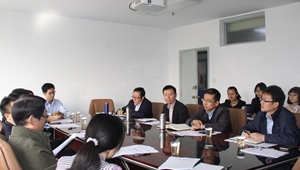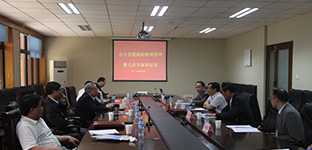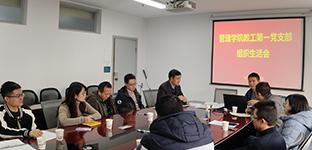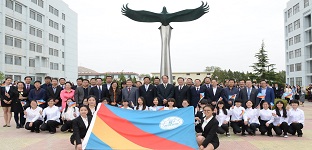
- 个人简介
- 研究领域
- 主讲课程
- 研究成果
- 研究项目
- 获奖情况
杨利雄,男,博士,教授,博士生导师,萃英学者。主要研究领域包括公司财务、金融计量、经济大数据与机器学习理论方法等相关研究领域。(学术主页:https://github.com/lixiongyang 和 https://gitee.com/YangLixiong)
近年来,主持国家自然科学基金青年项目、面上项目、重点项目子课题,国家社会科学重大项目子课题、中央高校基金项目等科研项目多项。主要研究成果以第一作者或唯一作者发表于国内外著名期刊,Econometrics Journal, Econometric Reviews, Journal of International Money and Finance , Journal of Time Series Analysis, Economics Letters, Applied Economics, Studies in Nonlinear Dynamics and Econometrics , Empirical Economics, Pacific-Basin Finance Journal,《统计研究》、《中国管理科学》、《系统工程理论与实践》等。
担任《经济学季刊》、《中国管理科学》、《管理学报》、Journal of Econometrics、Journal of Banking and Finance、Economics Letters、Empirical Economics、Journal of International Money and Finance、Studies in Nonlinear Dynamics and Econometrics、Applied Economics Letters等多个国内外知名期刊审稿人,担任国家自然科学基金、中国博士后基金等项目通讯评审专家。
出版教材《计量经济学-基于stata应用》,该教材入选首批“十四五”普通高等教育本科省级规划教。主持兰州大学教学改革示范课程《计量经济学》,以及课程体系改革与建设:计量理论可视化与思政教育实证数据化等教学改革项目。指导大学生国家创新项目多项,获得“挑战杯”甘肃省大学生创业计划竞赛省级优秀指导老师(2021)、兰州大学本科毕业论文优秀指导教师(2021)、兰州大学大学生创新创业计划优秀指导教师(2020)。
出版教材(入选首批“十四五”普通高等教育本科省级规划教材):《计量经济学-基于stata应用》,清华大学出版社,2024.01. 勘误表:https://github.com/lixiongyang/errata-of-econometrics
研究兴趣:
1)公司金融、资本市场
2)宏观经济与微观企业行为
3)财务预警、金融科技
4)经济大数据与机器学习及其应用
5)计量经济理论及其应用
主讲课程:
本科:微观经济学、运筹学、应用统计分析、计量经济学
研究生:计量经济学、机器学习
MBA:管理经济学
博士研究生招生要求:
欢迎有财务会计、金融经济、计算机、数学等背景的应届硕士生报考,本团队主要在财务金融、财务计量、宏观经济与微观企业行为和机器学习交叉领域开展研究【工商管理-财务会计方向】。报考者需要具备阅读英文期刊论文的能力和写作能力。拟申请者在联系时需附研究计划和其他研究成果等材料。
硕士研究生招生要求:
有学术兴趣和科研志向,在财务管理、金融、计算机、统计学和英语方面有较好基础。本团队将系统学习计量经济学前沿理论和机器学习方法以及R、Stata、Python等软件,在公司财务、公司治理等方向开展研究(会计与财务管理方向),拟申请者在联系时需附本科阶段的材料。(自2024年起,不再招收应用统计专业学位考生)
教育经历:
2009.9-2014.3 西安交通大学 博士
2005.9-2009.7 四川大学 学士
主要荣誉:
2017. 陕西省优秀博士学位论文奖, 陕西省教育厅。
2016. 西安交通大学优秀博士学位论文奖,西安交通大学研究生院。
实证金融(财务计量、公司金融、金融市场、宏观金融等)、计量经济模型及其应用、经济大数据与机器学习及其应用
出版教材(入选首批“十四五”普通高等教育本科省级规划教材):《计量经济学-基于stata应用》,清华大学出版社,2024.01. 勘误表:https://github.com/lixiongyang/errata-of-econometrics
一、 英文期刊论文
(22) Lixiong Yang, I-Po Chen, Chingnun Lee, Mingjian Ren. Panel threshold model with covariate-dependent thresholds and unobserved individual-specific threshold effects. Econometric Reviews (SSCI, ABS Grade 3), 2024, accepted.
(21) Lixiong Yang, Mingjian Ren, Jianming Bai. Threshold mixed data sampling logit model with an application to forecasting U.S. bank failures. Emprical Economics (SSCI, ABS Grade 2), 2024, accepted.
(20) Lixiong Yang, Ho-Chuan Huang. Adjustment speed of psychological anchors:
a comparative study of the G7 and BRIC stock markets[J]. Applied Economics Letters (SSCI, ABS Grade 1), 2024: 1-9.
(19) Lixiong Yang, Liangyan Yao, Jianzu Wu. Is there a state-dependent optimal interval for firms’ R&D investment? Evidence from China[J]. Applied Economics (SSCI, ABS Grade 2), 2024: 1-15.
(18) Lixiong Yang, Liangyan Yao, Yanli Xie. Panel kink threshold model with multiple covariate-dependent thresholds[J]. Applied Economics Letters (SSCI, ABS Grade 1), 2024: 1-4.
(17) Lixiong Yang, Hujie Bai, Mingjian Ren. Threshold Quantile Regression Neural Network[J]. Applied Economics Letters (SSCI, ABS Grade 1), 2023.
(16) Lixiong Yang. Panel threshold model with covariate-dependent thresholds and its application to the cash flow/investment relationship. Studies in Nonlinear Dynamics and Econometrics (SSCI, ABS Grade 2), 2023, accepted.
(15) Lixiong Yang. Varaible selection in threshold model with a covariate-dependent threshold. Empirical Economics (SSCI, ABS Grade 2), 2022, accepted.
(14) Lixiong Yang. High Dimensional Threshold Model With a Time-Varying Threshold Based on Fourier Approximation. Studies in Nonlinear Dynamics and Econometrics (SSCI, ABS Grade 2), 2022, accepted.
(13) Lixiong Yang, ChunliZhang. Threshold Mixed Data Sampling Models with a Covariate-Dependent Threshold. Appllied Economics Letters (SSCI, ABS Grade 1), 2022, accepted.
(12) Lixiong Yang. Time-varying threshold cointegration with an application to the Fisher hypothesis. Studies in Nonlinear Dynamics and Econometrics (SSCI, ABS Grade 2), 2021, accepted.
(11) Lixiong Yang. Threshold Mixed Data Sampling (TMIDAS) Regression Models with an Application to GDP Forecast Errors. Empirical Economics (SSCI, ABS Grade 2), 2021, accepted.
(10)WeiLili, Chunli Zhang, Jen-Je Su, Lixiong Yang. Panel threshold spatial Durbin models with individual fixed effects. Economics Letters,(SSCI, ABS Grade 3), 2021, (forthcoming)
(9) Yang L, Zhang C, Lee C, Chen I-P. Panel kink threshold regression with a covariate-dependent threshold [J]. Econometrics Journal(SSCI, ABS Grade 3), 2020, forthcoming(https://doi.org/10.1093/ectj/utaa035).
(8) Yang L, Lee C, Chen I-P. Threshold model with a time-varying threshold based on Fourier approximation [J]. Journal of Time Series Analysis, (SSCI/SCI, ABS Grade 3), 2020, forthcoming. (https://doi.org/10.1111/jtsa.12574)
(7)Lixiong Yang. State-dependent biases and the quality of China's preliminary GDP announcements[J]. Empirical Economics (SSCI, ABS Grade 2), 2020, 59: 2663–2687.
(6)Lixiong Yang. Regression discontinuity designs with state-dependent unknown discontinuity points: Estimation and testing[J].Studies in Nonlinear Dynamics and Econometrics (SSCI, ABS Grade 2), 2019, 23(2):1-18.
(5)Lixiong Yang, Jen-Je Su. Debt and growth: Is there a constant tipping point?[J]. Journal of International Money and Finance(SSCI, ABS Grade 3), 2018, 87:133-143.
(4)Lixiong Yang, Chingnun Lee and Jen-Je Su. Behavior of the Standard Dickey-Fuller Test When There is a Fourier-Form Break Under the Null Hypothesis[J]. Economics Letters (SSCI, ABS Grade 3), 2017, (forthcoming).
(3)Lixiong Yang. An Assessment on the quality of China's Preliminary Data of Quarterly GDP Announcements [J]. Applied Economics (SSCI, ABS Grade 2), 2017, 49:5558-5569.
(2)Chingnun Lee, J-L Wu and Lixiong Yang. A Simple Panel Unit-Root Test with Smooth Breaks in the Presence of a Multifactor Error Structure[J].Oxford Bulletin Economics and Statistics(SSCI, ABS Grade 3),2016, 3(78): 365-393.
(1) Lixiong Yang, Chingnun Lee and Fushun Shie. How close a relationship does a capital market have with other such capital markets? A reexamination based on the equal variance test[J].Pacific-Basin Finance Journal(SSCI, ABS Grade 2),2014 (26):198-226.
二、 CSSCI 期刊论文
[23]杨利雄,姚良燕,李庆男.经济增长目标压力与企业过度投资倾向[J].统计与信息论坛,2022,37(10):25-38.
[22]杨利雄,赵君昌,李庆男.双重机器学习处理效应估计的蒙特卡洛模拟[J].统计与决策,2022,38(06):26-31.DOI:10.13546/j.cnki.tjyjc.2022.06.005.
[21] 杨利雄.基于傅里叶近似的时变门槛拐点回归模型及其应用[J].数理统计与管理, 2020,已录用.
[20] 杨利雄,李庆男. 永久性结构变化下 Dickey-Fuller 检验的伪拒绝研究[J].系统工程理论与实践,2020,已录用.
[19] 杨利雄,张春丽,李庆男. 中国季度 GDP 核算数据质量研究[J]. 统计与信息论坛,2020,35(02):3-9.
[18]张春丽, 杨利雄,李庆男.门槛存在性Bootstrap检验有限样本性质的蒙特卡洛模拟分析[J].统计与决策,2019,3504:37-40.
[17] 杨利雄,李庆男.我国的通货膨胀与名义利率粘性:长期与短期费雪效应[J].中国管理科学,2019,2702:1-8.
[16] 杨利雄,张春丽,李庆男.时变门槛设定下门槛回归模型有限样本性质的模拟分析[J].统计与决策,2019,3521:9-12.
[15] 杨利雄,李庆男.基于傅里叶变换的时变参数回归模型:估计、设定检验和实证应用[J].统计与信息论坛,2018,3302:10-16.
[14] 杨利雄,张春丽.研发回报率、地方政府研发支出与经济增长的统计考察[J].统计与决策,2018,3412:119-122.
[13] 杨利雄,张春丽.中国季度 GDP 初步核算数据质量的评估[J].统计与决策,2018,3414:5-9.
[12] 杨利雄,张春丽.基于时变参数模型的中国研发投入回报率估算[J].统计与决策,2017,01:98-101.
[11] 杨利雄,张春丽,李庆男.平稳的平滑转移自回归过程之间的虚假回归问题研究[J].统计与决策,2017,06:15-19.
[10] 杨利雄,张春丽,李庆男.含非线性的平稳变量之间的虚假回归研究[J].统计与信息论坛,2016,3101:18-24.
[9] 杨利雄,张春丽,李庆男.基于傅里叶变换的含异质性结构突变的面板单位根检验[J].统计研究,2016,3302:86-90.
[8] 杨利雄,张春丽,刘光建.等均值检验:一种考虑横截面相关的检验方法[J].统计与决策,2016,07:18-21.
[7]张春丽, 杨利雄,李庆男.傅里叶型平滑结构突变下 Dickey-Fuller 检验的功效——兼论 Shibor 的平稳性[J].统计与信息
论坛,2016,3105:21-26.
[6] 杨利雄,李庆男.协整模型的“协整度”:等方差检验和其有限样本表现[J].统计与决策,2014,04:27-30.
[5] 杨利 雄 ,张春丽.基于傅里叶变换的 含确定性 趋 势结构突变的 协整回归 模 型和不等方差 检验[J].统计研
究,2014,3111:96-100.
[4] 杨利雄,李庆男.中国股市与国际股市联动关系的密切程度[J].山西财经大学学报,2013,3503:22-32.
[3] 杨利雄,李庆男.中国经济的区域影响力超过日本了吗——基于不等方差检验的一种衡量方法[J].南方经
济,2013,05:57-68.
[2] 杨利雄,张春丽,李庆男.平滑结构突变下 Dickey-Fuller 检验的大样本行为[J].统计研究,2013,3011:103-108.
[1] 杨利雄.IPO 锁定期、信息生产和效率[J].南方经济,2013,11:60-73.
国家自然科学基金面上项目,72273059,高维混频数据时变门限模型:理论、方法与应用,主持人
国家自然科学基金重点项目子课题,72034003,多能互补的协同运行体系及其宏观效应研究,子课题负责人
国家自然科学基金项目,71803072,基于傅里叶近似的时变门槛模型:估计、检验及其应用,主持人。
中央高校基本科研业务费专项资金项目,15LZUJBWZY097,含非线性的平稳变量间的虚假回归问题研究,主持人。
中央高校基本科研业务费专项资金项目,18LZUJBWZY010, 状态依赖门槛模型及其应用,主持人。





















